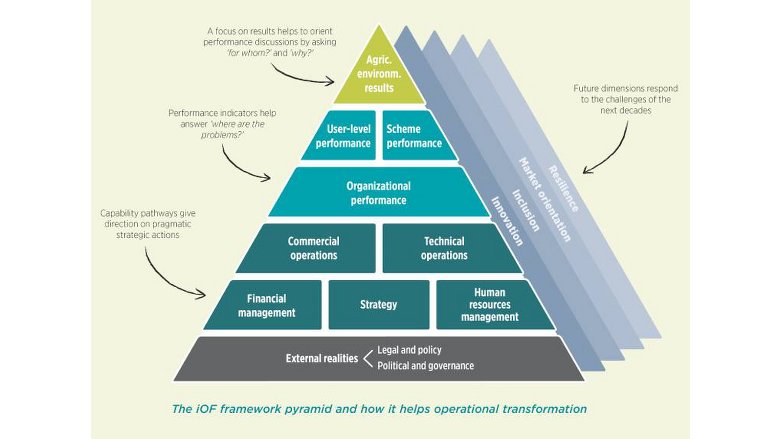WBG: The Irrigation Operator of the Future (iOF) Toolkit was produced by the Water in Agriculture Global Solutions Group (WiA GSG) to support operators of medium-sized and large irrigation schemes in developing countries, including public and private sector entities. The toolkit was based on the Utility of the Future Program that the World Bank developed for use in the water supply and sanitation sector.
The iOF toolkit (download) comprises the following main elements:
- A guide to the iOF-facilitated problem-centered approach
- A description of the operator’s surrounding context, role, and functions
- A suite of 18 performance indicators to select from as needed
- A performance data entry portal with graphical outputs
- Pathways for visioning and strategic planning
- A framework for facilitated action planning
Operators first assess their own performance and then use the results of this assessment to gain insight into core challenges in service provision for management decision making by relevant stakeholders (e.g., by irrigation operators, farmers, planners, policy makers, investors). By providing feedback on I&D processes (at all levels of a system), assessments help determine performance levels and identify corrective actions needed.
A strategic planning process is then undertaken to address the challenges that the self-assessment revealed. As part of the planning process, a vision of the future is created with the assistance of available options for undertaking changes as part of short- and long-term action plans. The overall iOF process supports adaptive, performance-oriented management that responds to changing needs and operating environments.
Main iOF outputs include:
- a rapid performance assessment—ongoing
- strategic capability
- a 100-day action plan
- a 5-year investment plan
The iOF framework
The flexibility and scope of the iOF toolkit distinguishes it from other performance assessment frameworks developed in recent decades that have focused on the hydraulic performance of infrastructure. The facilitated iOF approach encompasses the whole operational ecosystem—policy, governance, technical, and financial dimensions—to improve practices and performance outcomes.
The main elements of the iOF framework are illustrated in the pyramid below, with the external environment at the base and the ultimate outcomes at the peak. The iOF framework pyramid is linked to the Excel spreadsheet section of the toolkit, which generates performance assessment outputs.
The base layer represents the external environment in which the operator functions. The organizational activity and infrastructure layer (commercial and technical functions, strategy formulation, financial and human resources management) includes tasks over which an operator has direct control. The irrigation services performance layer encompasses three sets of outcomes within and outside an I&D scheme’s boundary (organizational performance, user-level performance, scheme-level performance).
Although the operator does not control the agricultural and environmental outcomes at the top of the pyramid, service delivery performance strongly influences these outcomes. Future dimensions, visualized as layers of a third dimension, extend beyond quantifiable service delivery aspects and include less easily measured qualitative expectations from forward-looking irrigation operators based on their vision of the future.

